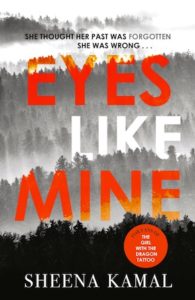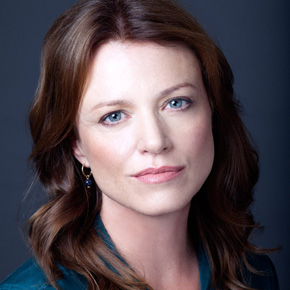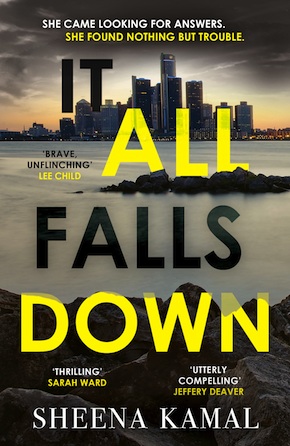Sheena Kamal: The rage that simmers
by Karin SalvalaggioIt All Falls Down is the second in what will hopefully turn out to be a long-running series of crime novels by Canadian author Sheena Kamal. Once again focused on an enigmatic female protagonist named Nora Watts, it is a worthy follow up to Kamal’s critically acclaimed debut Eyes Like Mine. I may be a little in love with Nora. Her interior monologue has the kind of bite that I’d like to see in more female protagonists. Her observations are unflinching, feminist, highly intelligent, and for the most part private. Her reticence unnerves those around her. By holding back, she draws people in. It’s an interesting device that plays out in myriad ways.
I was fortunate to meet Sheena at Iceland Noir, a three-day crime fiction festival that took place in November 2018 where she appeared on a panel moderated by Abby Endler, American crime fiction blogger extraordinaire. I managed to get my hands on a copy of It All Falls Down soon after returning to London. I read it cover-to-cover twice, often going over passages several times. There is much to admire.
I tracked Sheena down in Vancouver for a lengthy and hugely enjoyable session on Skype. Here are the highlights.
KS: Nora Watts is difficult to pin down. She doesn’t react to situations in a way most people would consider normal. It makes her interesting but also unpredictable. She reminds me of Isabelle Huppert’s character in the film Elle. If you haven’t seen it, you should. Can you tell us a little bit more about Nora’s background and what inspired her character?
SK: Going into the first book of the series, I knew that Nora was going to be a loner, a misfit, a troubled soul. Nora used to work for a small private investigation outfit in Vancouver. She’s not a licensed investigator herself, but she did a lot of the off-books work for them because she has a knack for discerning lies. At the beginning of It All Falls Down, Nora’s skills from that world are put to use as she looks into her father’s death, which happened many years ago. Her character is largely inspired by my interest in writing a more diverse and representative Canada, and also by my fascination with blues music, which I often use as a tool to get into her head.
People have strong reactions to Nora – mostly negative. However, those who have positive reactions respond mostly to that troubled, lost soul of hers.”
A surprising number of people warm to Nora even when they sense they shouldn’t. I’m referring to private investigator Brazuca and the Detroit detective Sanchez specifically, but there’s also Harvey, Simone, Kovak and a host of other characters. People seem to want to protect her, sleep with her, confide in her or kill her. What do you suppose it is about Nora’s character that provokes such extreme reactions?
Nora lives life on her own terms and doesn’t care much about others’ opinions of her. People have strong reactions to her – mostly negative. However, those who have positive reactions respond mostly to that troubled, lost soul of hers. She desperately needs human connection, and that can be compelling. Especially since she’d never ask for it.
Nora’s interior monologue is pithy, irreverent, observed, and often combative. It is a well-considered voice that feels genuine. There’s a particularly thought-provoking passage on page 155 that I’ve read several times:
Does he sense my confusion? All the things I’m trying to keep tamped down in my gut? Of course, he doesn’t, and this ability to exist like this, hidden in plain view, is not unique to me. Women do it every day… We don’t want them to see the rage that simmers just beneath the surface.
Nora is talking to Kovak about her father, but it feels like there’s so much more going on in this scene. How much of your own feelings about feminism and gender violence find their way onto the page?
 I’m happy to say that I’m one of those writers who can totally divorce myself from my work, which is a product of my imagination, not of my experience. Kidding! That would be impossible, and also, I wouldn’t even try it. Gender violence is an important issue for me. Feminism is equally important. Going into this series, I absolutely wanted to talk about gender, but also about race and class. The work itself is infused with my own impressions about these topics, but I try to stay true to Nora’s character and try to see the world through her eyes. Only the people who know me very well are able to discern how much or little of myself I bring to the page. I’m happy to say, not very many of them exist, so I can blame these hot takes mostly on my imagination.
I’m happy to say that I’m one of those writers who can totally divorce myself from my work, which is a product of my imagination, not of my experience. Kidding! That would be impossible, and also, I wouldn’t even try it. Gender violence is an important issue for me. Feminism is equally important. Going into this series, I absolutely wanted to talk about gender, but also about race and class. The work itself is infused with my own impressions about these topics, but I try to stay true to Nora’s character and try to see the world through her eyes. Only the people who know me very well are able to discern how much or little of myself I bring to the page. I’m happy to say, not very many of them exist, so I can blame these hot takes mostly on my imagination.
The story is told through Brazuca and Nora’s points of view. The two narrative strands play out in separate chapters that run in parallel. It’s only in the latter part of the novel that we see the link between their two storylines. Brazuca’s strand is linear: a crime is committed, an investigation follows. In contrast, Nora’s storyline meanders. Nothing she’s dealing with makes any sense. She wanders around Detroit, shunted from one incident to another. Her rental car is stolen, her hotel room is broken into, she sings in a blues club, she hangs out in a bar, she breaks into a house… Chance seems to play an enormous role in this book, yet it comes together beautifully in the end. Do you roll the dice with every scene or is there a master plan?
There’s always a master plan. You’re right, though. Brazuca is looking into a definitive crime that took place, but Nora’s purpose is to gather information about a life lived. Her father’s life. Naturally, it has to be a more delicate investigation. It has to be frustrating for her to try to find out information about someone who died a long time ago. In terms of how I approached writing these two parallel storylines, I write to an outline and try to stick to it to make sure I get the twists in. Sometimes, though, the scene takes a different turn and I’ll just go with it, if it feels right. I always try to test the boundaries of what the story will allow.
Her mother abandoned her as a young child, so her father was the only parent she remembered. She loved him, and believed her life would have been different, better even, if he’d lived.”
I’d like to discuss Nora’s reaction to the veteran she meets in the park. Unnerved by the nature of the information he’s given her about her father, she ignores her better instincts which are to distrust and fear him. He is, after all, a man who’s been following her in the dark. What is about Nora’s past that makes her vulnerable to this type of manipulation?
Nora has had a very tumultuous relationship with family throughout her life, so it’s definitely her Achilles heel. What the veteran does is cast doubt on the circumstances around her father’s death, and she can’t resist investigating. Her mother abandoned her as a young child, so her father was the only parent she remembered. She loved him, and believed her life would have been different, better even, if he’d lived. Her family, her roots – these are tough things for her to reconcile with. There’s a compulsion there.
Nora is a child of violence and has conceived child in violence. It is understandable that she avoids romantic intimacy, family ties and friendships, but why does she not shun violence as well?
Violence is a part of her life. It’s an uncomfortable part of writing her, to be honest, but her story doesn’t come out any other way. Perhaps in the future I’ll send her to a yoga retreat in Bali or something, and she’ll come back as a font of wisdom and tranquillity. One can only hope.
Nora is dismissive of her past interactions with Brazuca: “There’s nothing between us but mistrust and single orgasm.” They only come face to face once in the space of 322 pages, yet their shared history underpins much of what happens. She remains unaware of Brazuca’s involvement, of his desire to keep her safe, which feels like unfinished business to me. It All Falls Down is the second instalment in a trilogy. Will we be seeing more of Nora and Brazuca in the next one? Any hint of what we can expect?
Yes, there will definitely be more of Brazuca! The more I write him, the more I’m interested in how his story unfolds. For the next book, Brazuca’s hero complex won’t let him be rid of Nora just yet. They have a complicated connection, these two, and I have a pretty intense development planned for them coming up.
 Sheena Kamal holds an HBA in Political Science from the University of Toronto, which she attended on Canada’s most prestigious scholarship, received for community leadership and activism around the issue of homelessness in Toronto. She went on to work in the film and TV industry, most recently as a researcher for a crime drama series being developed for television. Her research into crime and investigative journalism inspired the Nora Watts series. Eyes Like Mine and It All Falls Down are published by Zaffre/Bonnier Books.
Sheena Kamal holds an HBA in Political Science from the University of Toronto, which she attended on Canada’s most prestigious scholarship, received for community leadership and activism around the issue of homelessness in Toronto. She went on to work in the film and TV industry, most recently as a researcher for a crime drama series being developed for television. Her research into crime and investigative journalism inspired the Nora Watts series. Eyes Like Mine and It All Falls Down are published by Zaffre/Bonnier Books.
Read more
sheenakamal.com
@sheenakamalwrites
Author portrait © Malcolm Tweedy
 Karin Salvalaggio is the author of the Macy Greeley crime novels Bone Dust White, Burnt River, Walleye Junction and Silent Rain and a contributing editor at Bookanista. Her fiction to date is set in towns that border the Montana wilderness, a uniquely spectacular landscape she fell in love with as a child. Her proudly independent characters inhabit stories about the American dream gone wrong. She is currently working on the final edits of a psychological thriller set closer to home in West London, where she has lived since 1994. The characters may be hemmed in by glass and steel, but the stories they tell are just as compelling.
Karin Salvalaggio is the author of the Macy Greeley crime novels Bone Dust White, Burnt River, Walleye Junction and Silent Rain and a contributing editor at Bookanista. Her fiction to date is set in towns that border the Montana wilderness, a uniquely spectacular landscape she fell in love with as a child. Her proudly independent characters inhabit stories about the American dream gone wrong. She is currently working on the final edits of a psychological thriller set closer to home in West London, where she has lived since 1994. The characters may be hemmed in by glass and steel, but the stories they tell are just as compelling.
karinsalvalaggio.com
@KarinSalvala
@karinsalvalaggio


